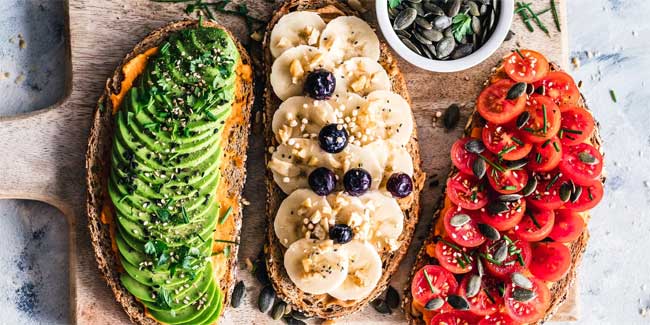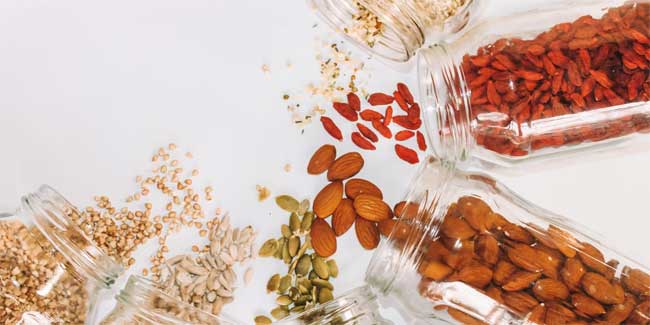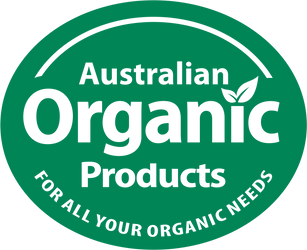
Plant-based vs. Vegan: What is the difference?
As wellness moves to the forefront of people's minds, the terms plant-based and vegan may have come into the conversation more and more. As the different lifestyle choices are discussed, you may feel that there isn't much difference between the two. Aren't they the same diet under two different names?
If you're wondering the same things we were, then check out our blog. We've done all of the research we can to find out how eating a plant-based diet and a vegan diet can differ, including the health benefits of each.
History of veganism
Though the term 'vegan' first entered common usage in 1944 with the inception of the Vegan Society, veganism as a concept has been around for centuries. Some of the earliest known followers of the vegan diet go back to the 5th century BCE to followers of the ancient religion, Jainism, and many countries, including China, Japan, Greece and Jamaica, have both vegetarian and vegan traditions that can be dated back centuries.
These cultures and traditions adhered to similar concepts as those of modern vegans. The diet banished animal products and sometimes extended into their lifestyle. Jains, in particular, follow a lifestyle of inflicting no harm upon living creatures.
The modern vegan diet, or vegan lifestyle, set out by the Vegan Society is for anyone who avoids animal products for ethical reasons, like animal welfare, but extending also to the environment and health concerns in more recent times.
The vegan diet has expanded since its beginnings with lots of different 'versions,' for people to adhere to, including the raw vegan diet and plant-based eating, which we will discuss next.

Origins of plant-based diets
The term plant-based came into existence a number of years after veganism made its debut in western society, and though the diets are similar, there are key differences.
A plant-based diet was first proffered in 1980 by a nutritionist to describe a low-fat, high fibre, vegetable-based diet. Unlike veganism, a plant-based diet does not fully exclude meat, poultry, fish, and other animal products, but simply chooses less of them.
The plant-based diet focuses more on whole foods which are low fat and come primarily from plant sources. A plant-based, healthy diet can mimic both vegan and vegetarian diets, as well as omnivorous diets, with meat, poultry, fish, and dairy products being allowed but kept in lower volumes than a more mainstream diet.
So, what does it mean?
A vegan diet and a plant-based diet have lots of similarities, but while both avoid animal products, veganism banishes these animal ingredients from the diet, whereas plant-based diets focus more on the nutritional aspects of what is being eaten.
Where veganism appears more a lifestyle choice based on ethics, a plant-based diet focuses much more on low fat, high fibre whole foods which provide essential nutrients and is not ethics-related.

Diet: Vegan diet vs a plant-based diet
Though they are extremely similar, there are some key differences between plant-based and vegan diets. We've rounded up all the information you need below.
Vegan diet
The vegan diet is considered much stricter than a plant-based one. Sometimes considered a more extreme version of the vegetarian diet, vegans can eat everything a vegetarian can sans the dairy products, eggs, and animal ingredients and derivatives like gelatin and animal fats. Both a vegan and vegetarian diet are devoid of meat and fish.
The vegan diet used to come with restrictions on snacks and processed foods, however, there has been much development in recent years of vegan food, particularly vegan snack food. Where once you may not have been able to find vegan treats, you can now find them in abundance.
The market is now ripe with vegan alternatives to common treats, like this incredible vegan chocolate from Alter Eco, this protein-packed vegan cookie from Food to Nourish, and this organic and vegan liquorice from YumEarth. And even more interesting, is this teriyaki vegan jerky from Noble Jerky (who actually offer quite the range of vegan jerky!)

Plant-based diet
A plant-based diet focuses on low-fat, high fibre whole foods, like nuts and seeds, legumes, grains, fruit and veg, and can include meat and dairy products, though in limited amounts. A plant-based diet restricts heavily processed foods, including processed plant foods and may be considered a healthy version of the 'flexitarian diet' by some. Eating a plant-based diet means eating more essential nutrients while avoiding animal foods as much as possible.
Plant-based diets are more focused on the health benefits of the diet, rather than the ethics, meaning less processed snack food is consumed and healthier options like superfoods and dried fruit are consumed. The plant-based diet also avoids processed oils, refined white flour, and products with added sugar.
If you're planning on making the switch, eating plant-based is easy when you shop with us here at Australian Organic Products + More. With plenty of plant-based products, like this plant-based beef mix from Deliciou and this dark chocolate (with no added sugar!) chocolate orange bar from Well Naturally, you'll find everything you need in our plant-based selection.
Lifestyle: Restrictions, considerations
With both diets come some lifestyle restrictions. For vegans, this includes choosing vegan products in other areas of their lives, such as avoiding clothing made from animal materials, and for plant-based eaters, this could extend to other healthy choices, such as exercise.
While veganism is more restrictive as a lifestyle choice, the plant-based diet rejects certain vegan foods, such as those with added sugar.

Conclusion
Overall, both diets have plenty of similarities which is why they tend to be used interchangeably. In addition, many who start out vegan may become plant-based and vice versa, depending on their reasons for making the change in the first place.
Though both diets used to be much more difficult to follow, recent innovations in the food industry have meant it is much easier for both kinds of eaters to get all of their essential nutrients and lead healthy lives while following more restrictive diets.
Frequently Asked Questions
Is vegan healthier than plant-based?While vegan and plant-based diets are similar, plant-based may be considered healthier than a vegan diet. This is because the plant-based diet focuses on whole foods, such as grains, nuts, legumes, seeds, fruit, and veg whereas a vegan diet simply rejects all animal produce. While vegans may not eat any animal products, they can eat processed foods. A plant-based diet avoids overly-processed and refined foods, as well as foods with added sugar, making them richer in essential nutrients.
Is vegan considered plant-based?A vegan diet is a plant-based diet in the sense that only foods with plant sources can be eaten. Many on a plant-based diet do not eat any animal products at all, where some may choose to eat limited amounts of meat and dairy. Some may use the terms interchangeably though there are key differences between the two kinds of diet.
Is plant-based and vegetarian the same thing?Some who follow a plant-based diet may consider themselves vegetarian because they limit animal products, however, the plant-based diet does allow for meat and fish consumption provided it is in limited amounts. A plant-based diet means a diet that is based on low fat, high fibre fruits and veg but can include meat, poultry, fish, and dairy products too. Not all plant-based eaters are vegetarian and not all vegetarians are plant-based but there is some overlap.
What are the dangers of a plant-based diet?
Though it is considered a healthy diet, a plant-based diet may lead to vitamin deficiencies if not followed correctly. While plant-based diets do allow meat and dairy consumption, it is restricted. This could lead to protein and mineral deficiencies. To combat this, anyone following the diet should look for fortified foods and ensure that they are hitting all food groups within their meals.

Leave a comment